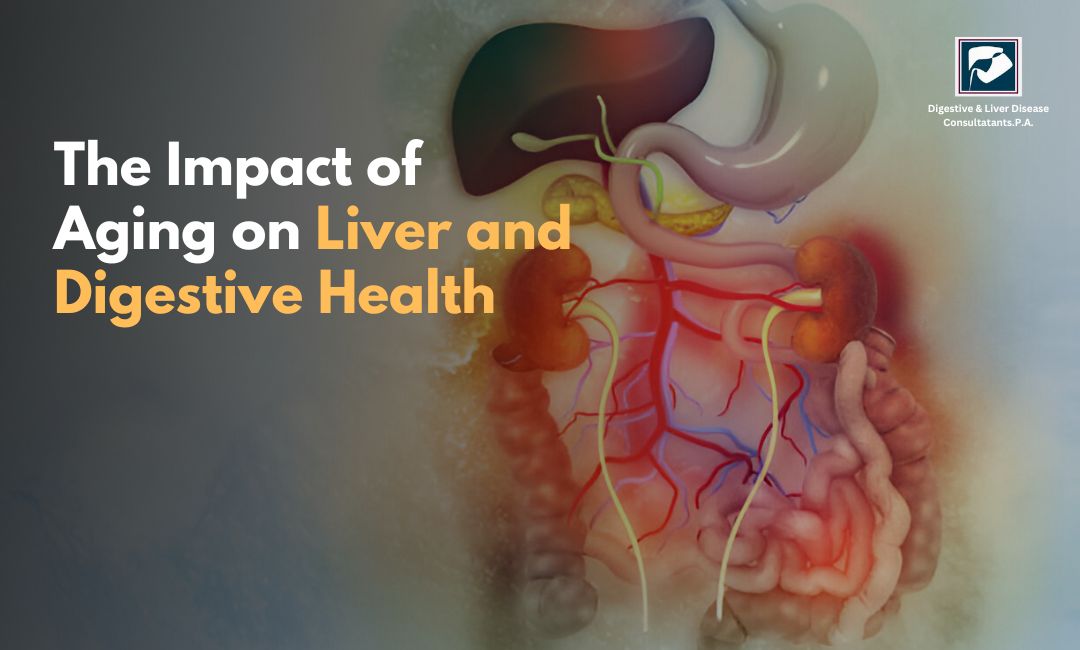As we age, our bodies undergo a variety of changes—some subtle, others more noticeable. While wrinkles and grey hair often take centre stage in discussions about aging, the impact on internal organs like the liver and digestive system is just as significant. These changes can affect how well your body processes food, absorbs nutrients, and eliminates waste. Understanding these shifts is key to maintaining good health as you grow older.
At Digestive & Liver Disease Consultants, P.A., we specialize in helping patients navigate the complexities of gastrointestinal (GI) and liver health at every stage of life. In this blog, we’ll explore how aging affects your liver and digestive system, what symptoms to watch for, and steps you can take to support long-term wellness.
How Aging Impacts Your Liver
The liver is one of the hardest-working organs in your body. It filters toxins, metabolizes medications, produces bile for digestion, stores energy, and regulates cholesterol levels. However, as we age, its efficiency begins to decline.
Reduced Regeneration Ability: One of the liver’s remarkable features is its ability to regenerate after injury or damage. Unfortunately, this regenerative capacity diminishes with age. Older livers may struggle to heal from infections, alcohol use, or exposure to harmful substances.
Decreased Blood Flow: Aging leads to reduced blood flow throughout the body, including to the liver. This means that essential nutrients and oxygen may not reach the liver as efficiently, potentially impairing its function.
Medication Metabolism Challenges: Many older adults rely on multiple medications to manage chronic conditions. Since the liver plays a critical role in breaking down drugs, an aging liver might process medications more slowly, increasing the risk of side effects or drug interactions.
Increased Risk of Fatty Liver Disease: Non-alcoholic fatty liver disease (NAFLD) becomes more common with age. This condition occurs when fat builds up in the liver, often due to poor diet, obesity, or insulin resistance. If left untreated, NAFLD can progress to inflammation, scarring (cirrhosis), or even liver failure.
The Effects of Aging on Digestive Health
Just like the liver, the digestive system experiences gradual changes over time. Here are some ways aging impacts digestion:
Slower Digestion: As we get older, the muscles in the digestive tract weaken, leading to slower movement of food through the stomach and intestines. This can result in constipation, bloating, and discomfort.
Changes in Gut Bacteria: The balance of bacteria in your gut—known as the microbiome—shifts with age. A less diverse microbiome can contribute to issues like indigestion, diarrhea, or nutrient deficiencies.
Weakened Esophageal Sphincter: The muscle that prevents stomach acid from flowing back into the esophagus can weaken with age. This increases the likelihood of heartburn and gastroesophageal reflux disease (GERD).
Nutrient Absorption Decline: Aging can reduce the production of enzymes needed to break down food and absorb vitamins and minerals. For example, many seniors experience decreased absorption of vitamin B12, calcium, and iron, which can lead to deficiencies.
Higher Risk of GI Disorders: Conditions such as diverticulitis, ulcers, and colorectal cancer become more prevalent in older adults. Regular screenings and early detection are crucial for managing these risks.
Common Symptoms to Watch For
If you’re experiencing any of the following symptoms, it could be a sign that aging is affecting your liver or digestive health:
- Persistent fatigue or weakness
- Unexplained weight loss or gain
- Abdominal pain or swelling
- Yellowing of the skin or eyes (jaundice)
- Frequent nausea or vomiting
- Chronic heartburn or acid reflux
- Changes in bowel habits, such as diarrhea or constipation
- Dark urine or pale stools
Ignoring these warning signs can lead to complications down the road. That’s why it’s important to seek medical advice if you notice anything unusual.
Tips for Supporting Liver and Digestive Health as You Age
While aging is inevitable, there are several proactive steps you can take to protect your liver and digestive system:
Eat a Balanced Diet: Focus on whole foods rich in fibre, lean protein, healthy fats, and antioxidants. Limit processed foods, sugar, and saturated fats, which can strain your liver and disrupt digestion.
Stay Hydrated: Drinking plenty of water supports kidney and liver function while preventing constipation.
Exercise Regularly: Physical activity boosts circulation, aids digestion, and helps maintain a healthy weight—all of which benefit your liver and GI tract.
Limit Alcohol Consumption: Excessive drinking accelerates liver damage. Stick to moderate alcohol intake or avoid it altogether if you have existing liver concerns.
Get Vaccinated: Protect yourself against hepatitis A and B, viral infections that can severely harm the liver.
Manage Stress: Chronic stress can negatively impact both liver and digestive health. Practice relaxation techniques like yoga, meditation, or deep breathing exercises.
Schedule Routine Screenings: Early detection saves lives. At Digestive & Liver Disease Consultants, P.A. , we offer comprehensive screenings for conditions like colon cancer, hepatitis, and GERD. Don’t wait until symptoms arise—schedule regular check-ups to stay ahead of potential problems.
Why Choose Digestive & Liver Disease Consultants, P.A.?
At Digestive & Liver Disease Consultants, P.A., our team of board-certified gastroenterologists and hepatologists is dedicated to providing personalized care tailored to your unique needs. With decades of combined experience, we use state-of-the-art technology and evidence-based treatments to diagnose and manage a wide range of GI and liver disorders.
Whether you need routine screenings, advanced endoscopic procedures, or ongoing management of chronic conditions, we’re here to guide you every step of the way. Our compassionate approach ensures that you feel informed, supported, and empowered to make the best decisions for your health.
Conclusion: Take Charge of Your Health Today
Aging doesn’t have to mean compromising your liver and digestive health. By understanding the changes that occur naturally with age and taking preventive measures, you can enjoy a vibrant, active lifestyle well into your golden years.
if you’re already experiencing symptoms or have concerns about your liver or digestive system, don’t hesitate to reach out to us. At Digestive & Liver Disease Consultants, P.A.






